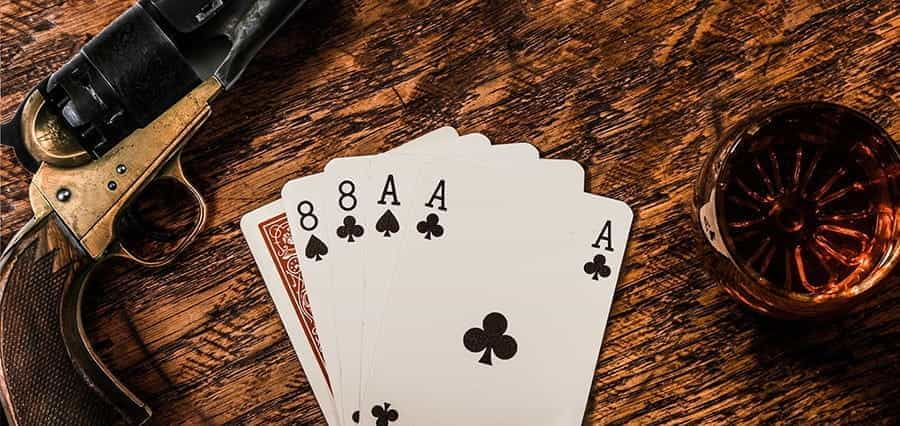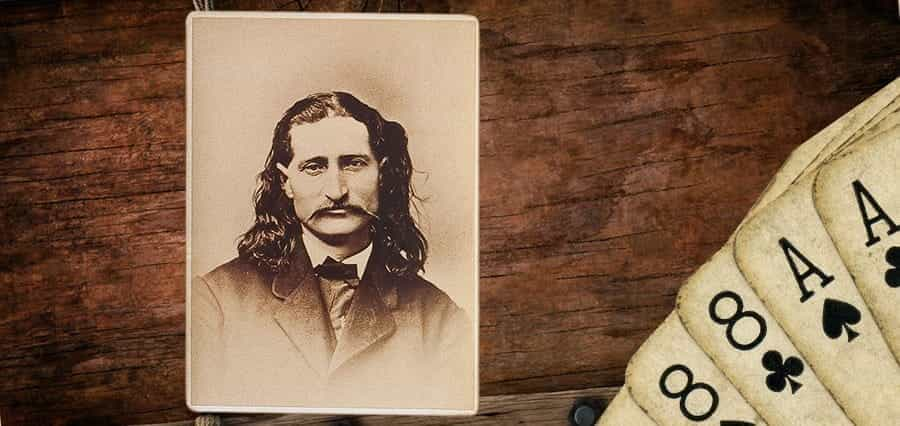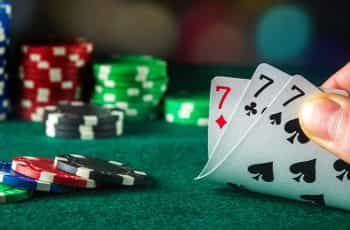
Who Was Wild Bill?
If you draw two black eights with two black aces in poker, the combination is known as a dead man’s hand. The story behind this name is a pretty interesting one, and it is all to do with a man named Wild Bill. At various times in his life he was a soldier, spy, wagon master, lawman, gunfighter, and – legend has it – bear fighter. You can say a lot of things about Wild Bill, but you can’t accuse him of being boring!
If you’ve watched season one of Deadwood then you’ll actually know more about this subject than you think. Known in American folklore as Wild Bill, the man in question was actually called James Butler Hickok, born in Illinois in 1837. He was also sometimes known by the unfortunate nickname of Duck Bill due to his long nose and pouting mouth. It’s not surprising that he grew a pretty impressive mustache which covered the lower half of his face after being given that name!
Wild Bill left his hometown at the age of 18 and went out into the world to make a name for himself. To be honest, it is quite difficult at times to establish how much of what happened out in the world is actually true, since there are some crazy stories surrounding this character. While driving a freight train in New Mexico, Bill apparently killed a bear by cutting its throat after being attacked. One man taking on a grown bear alone seems unlikely, but Wild Bill arrived at his destination with injuries to his arm, shoulder, and chest, so there could be some truth in it after all.
The journalists of the day loved to write about Wild Bill and sensationalized his exploits and adventures in the papers. After being elected as a marshal in a frontier town, Bill was involved in several gunfights which captured the public’s attention and he was soon known for his tough attitude towards trouble makers. It seems that things were blown a bit out of proportion, however. The papers at the time reported that Wild Bill killed over 100 people, but Joseph Rosa, a renowned biographer, and writer of Western history, disputes this and believes that Bill killed no more than six or seven people.
As if he wasn’t famous (or infamous) enough in his own right, Wild Bill has also been linked to frontierswoman and daredevil, Calamity Jane. In 1876, Bill was making good money as a gambler and showman. He was married to Agnes Lake, a circus owner, but left her in Cheyenne while he headed to South Dakota to seek his fortune in the goldfields. This is when he supposedly met Calamity Jane (real name: Martha Jane Canary) although many are highly skeptical of this claim, since it was only revealed for the first time in Jane’s memoirs much later on. We can’t know what happened between Bill and the two women, but a letter written to Agnes by Wild Bill shortly before he died reads: “Agnes Darling, if such should be we never meet again while firing my last shot, I will gently breathe the name of my wife – Agnes.” Which is pretty romantic, no matter what happened with Jane!

A Dead Man in Poker
So, Wild Bill obviously led an exciting and thrilling life (even if we can’t be sure how many of the stories are completely true) but what does all of that have to do with poker? Well, in the summer of 1876, Wild Bill arrived in the frontier town of Deadwood and soon became a frequent visitor at Nuttal and Man’s Saloon. Bill was an experienced gambler and excellent poker player, so he was usually very successful at the tables. Unfortunately, this – along with an inadvisably cavalier attitude – would be his downfall.
On 1st August 1876, Wild Bill won a large amount of money from a buffalo hunter called Jack McCall. In a shockingly condescending act, Bill then “generously” gave McCall a few bills back, so he could buy himself breakfast. It is impossible to know for sure if this was the reason for McCall’s actions the next day or not, but it certainly can’t have helped.
The following morning, Wild Bill went back to the same saloon to play some more poker. He usually sat with his back to the wall, facing the entrance, but this seat was taken when he arrived. Despite asking the player to move twice, Wild Bill ended up sat with his back to the door instead. This meant that he didn’t see Jack McCall when he walked in, took out his gun, and shot Wild Bill in the back of the head, allegedly shouting, “Damn you, take that!”
The infamous Wild Bill fell from his seat with his cards still clutched in his hand. Four cards fell face up; they were two black aces and two black eights. This is the legend of how the dead man’s hand got its name: the four cards that Wild Bill Hickock was holding when he was fatally shot.
The Truth, the Whole Truth, and Nothing but the Truth?
Wild Bill’s death was as full of exciting twists and turns as his life. After shooting Bill, Jack McCall was summoned before a miners’ jury to face a murder charge. McCall claimed that he had actually killed Bill in revenge for the lawman killing McCall’s brother, and was acquitted. You would think that that would be the end of it, but after bragging everywhere he went about killing Wild Bill, McCall was arrested for a second time. Double jeopardy was not considered to apply because of the irregular jury in the first trial. McCall was found guilty this time and sentenced to death. He was hanged on 1st March 1877.
Of course, what we are really interested in is whether or not this fascinating story is really the true one behind the term dead man’s hand. Joseph Rosa disputes this and says that there is no clear evidence that Wild Bill’s final cards were really the black aces and eights. It seems that the story only started circulating in the 1920s, more than four decades after Bill’s murder. It was only when a biography about the man’s life was published in 1926 that the two pairs of black aces and eights became the “unlucky” cards in poker.
In fact, a newspaper article in 1886 linked the dead man’s hand to an entirely different tale. It reported that a judge in the 1840s bet his last piece of property in a hand of poker because he was desperate and close to bankruptcy. The judge had a strong hand and believed that he had won, but then the other player revealed a winning hand. Upon seeing that he had lost, the judge apparently dropped dead then and there.
Obviously, we will probably never know for sure if Wild Bill’s story is true, or if it is definitely the source of the term dead man’s hand for that unlucky combo in poker. But either way – it is a great tale.
The Dead Man Lives On
Presumably, due to the exciting nature of the story, Wild Bill lives on today in a multitude of popular culture. The dead man’s hand appears as a code in Along Came the Spider by James Patterson, as the title of a book in the Wild Cards series by Game of Thrones author George R. R. Martin, and again in the Batman R.I.P. comic books. Music lovers can find mentions of it in songs by Bob Seger, Bob Dylan, the Church, and Motorhead. It often comes up as a sign of death in John Ford’s western movies, as well as in an episode of The X-Files. You can also find references to it in numerous computer games, including Fallout 4, The Walking Dead: A New Frontier, and Hearthstone. Clearly, this legend is not going to fade away any time soon!
Of course, the most prominent place for the term is still in poker and is generally attributed to Wild Bill’s death, regardless of whether it’s true or not. Aces and eights might have a different meaning in blackjack than they do in poker, but at some casinos, you can still find a side bet named after the dead man’s hand. You can also find it in Texas Hold’em although there it is counted as a single ace or eight of any suit and is actually considered good luck instead!
If you are as fascinated by Wild Bill’s story as thousands of others, you can always visit the dead man’s hand exhibition. It can be found in Saloon 10, one of the smallest casinos in the world and built in the exact location of the bar where Bill was shot and killed. You can play poker in the same place as Wild Bill did on his last day – or just peruse the exhibits if that is a bit too ghoulish for you!
Or, if reading this has made your hands itch and you want to get playing for yourself, then you can have a look at the best poker games to play online and the best sites to find them on in our full casino poker guide.



